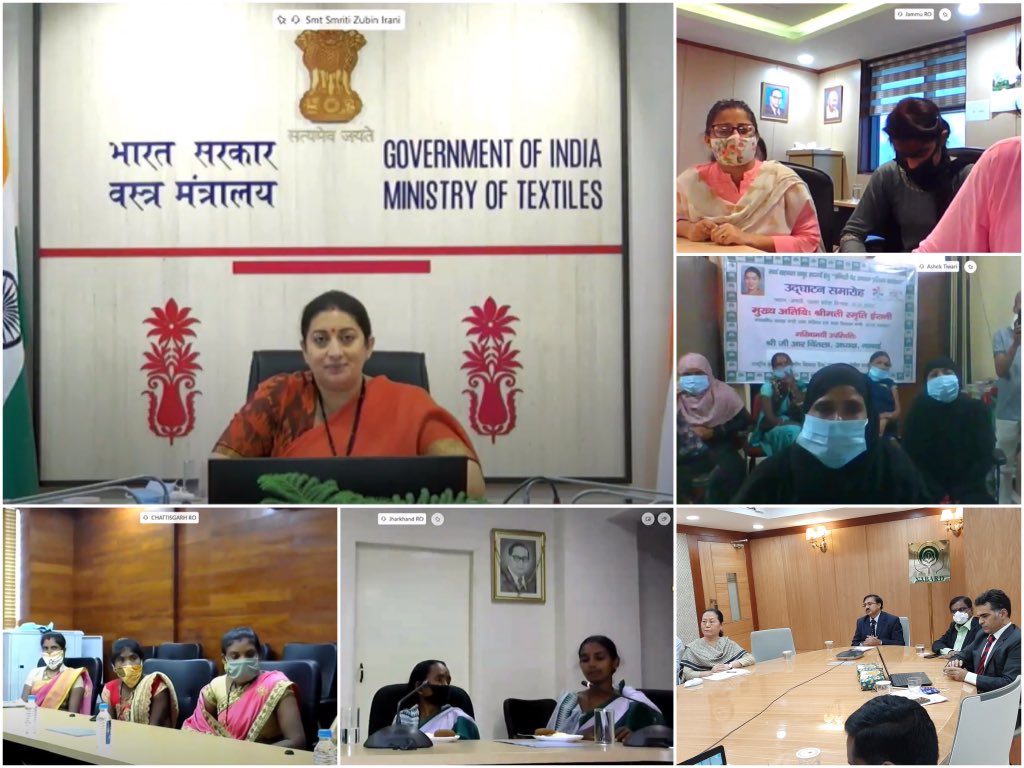India and it’s South Asian partners must re-imagine regional economic cooperation and integration: Smriti Irani
New Delhi: Ms Smriti Irani, Union Cabinet Minister for Textiles and Women & Child Development, GoI yesterday said that India and its South Asian partners must re-imagine regional economic cooperation and integration by taking leadership positions to create fresh south Asian value chains and tap deeply into existing value networks.
Speaking at the South Asia Session on Reimagining Neighbourhood Economic Integration at LEADS 2020, Ms Irani said, “The focus should be on creating a calibrated and systemic strategy of engagement with neighbours to create successful partnerships and value chains.”
Highlighting the importance of neighbourhood economic integrations among South Asian countries, Ms Irani said that the region has immense economic and political cooperation. “Economic integration gives way to economic growth and economic integration in South Asia can not only help to sustain our economic agendas but also lead to enhanced trade due to comparative advantages, free trade regime, investment opportunities due to the availability of a large market, availability of cheap capital, regional supply chains. It can also lead to the manufacturing of cheaper consumer goods, low food prices and create much needed jobs.”
The interaction of diverse civilisations in South Asia across millennia has brought to the surface certain fundamental features of each nation which while being rooted in our specific linguistic, religious and cultural form is universal. South Asian countries celebrate not only shared identities but also have a strong sense of interdependence, the minister said.
Ms Irani added that India has a vision of a stable, integrated, prosperous region through its neighbourhood first policy by catalysing the vision for regional economic growth and social development.
Applauding FICCI for curating the ‘Empowering the Greater 50%’ initiative for creating a suitable ecosystem for women leaders and entrepreneurs, the minister said, “When you imagine the India story, you cannot imagine it without the economic empowerment of Indian women. Women in India will be the flag bearers of economic resurgence.”
Speaking at the session Mr Sanjay Sudhir, Indian High Commissioner to the Maldives, said that economic integration supports both social and political understanding. “India is the fourth largest trading partner of Maldives. The engagement should be stepped up in alignment with India First and Neighbourhood First policy. We need to harness geographical proximity and the diverse product range of items which India can export,” he said.
Further, Mr Sudhir said that the concept of Atmanirbhar Bharat can also be looked at from a regional perspective. “We can promote economic self-reliance for our neighbours for mutual benefit. There is a lot of scope for the Indian hospitality market and healthcare industry. Another promising sector is the housing sector,” he added.
Mr Sudhir also extended an invitation to Indian industry giants to explore trade and business opportunities in the Maldives.
Addressing the session, Dr Sangita Reddy, President, FICCI said that the pandemic has brought to the fore the inadequacies of the healthcare systems across the world. “The countries of South Asia will need to be better prepared and equipped to handle such health crises, which would require envisioning advanced healthcare systems, collective efforts by the decision-makers, policy shapers and civilians to deal with future pandemics” she said.
Further, Dr Reddy said that India has the vision of a stable, integrated, prosperous region, regional economic growth and social development through a calibrated and systematic strategy of engagement with neighbours to create successful partnerships. “FICCI acknowledges that it is extremely important for us to find ways to reimagine our economic and bilateral relations with our neighbours and rekindle our shared values and complementarities to enhance economic integration,” said Dr Reddy.
Dr Junaid Ahmad, India Country Director, South Asia, World Bank speaking on relations between South Asian countries, said, “If you enter the game while understanding each other’s history, culture, people, it changes the nature of engagement completely.”
Sheikh Fazle Fahim, President, FBCCI, Bangladesh; MD, Obsidian Bangladesh Ltd said that they would explore trade recoveries through regional value chain initiatives.
Ms Bhawani Rana, President, FNCCI and MD, Hotel Sneha Pvt Ltd; Chairperson, Sneha Agro and Fortuna Healthcare, Nepal said, “South Asia is in an ideal position to attract diversification of investment and supply chain and become the hub of the supply chains. It is also one of the major regions that can bounce back with resilience to thrive post-COVID in the world order.”
Dr Massoud Parwanfar, CEO, Afghan Chamber Federation Afghanistan highlighted that to strengthen existing regional platforms, South Asia requires to concentrate on forming and convening new intra-regional frameworks to enable profound discussions on major policy issues to ensure private sector-oriented policy formulations.
Mr Nishal Ferdinando, CEO, JAT Holdings, Sri Lanka called for opportunities for engagement to create common labour regulations, the direct exchange of currency, enhanced connectivity and prevent brain drain by creating job and education opportunities at home.

